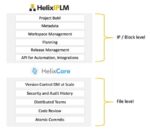I recall first blogging about Helix IPLM (formerly Methodics IPLM) at DAC in 2012, then Perforce acquired the company in July 2020, so I stopped by the Perforce booth this year at DAC to get an update from Martin Hall, Principal Solutions Engineer at Perforce. Martin’s background includes working at Dassault Systemes, Synchronicity,… Read More
Author: Daniel Payne
Perforce IP and Design Data Management #61DAC
Blue Cheetah Advancing Chiplet Interconnectivity #61DAC
At #61DAC, I love it when an exhibitor booth uses a descriptive tagline to explain what they do, like when the Blue Cheetah booth displayed Advancing Chiplet Interconnectivity. Immediately, I knew that they were an IP provider focusing on chiplets. I learned what sets them apart is how customizable their IP is to support specific… Read More
Scientific Analog XMODEL #61DAC
Transistor-level circuit designers have long used SPICE for circuit simulation, mostly because it is silicon accurate and helps them to predict the function, timing, power, waveforms, slopes and delays in a cell before fabrication. RTL designers use digital simulators that have a huge capacity but are lacking analog modeling.… Read More
Three New Circuit Simulators from Siemens EDA
The week before DAC I had the privilege to take a video call with Pradeep Thiagarajan – Product Manager, Simulation, Custom IC Verification at Siemens EDA to get an update on new simulation products. I’ve been following Solido for years now and knew that they were an early adopter of ML for Monte Carlo simulations with SPICE users.… Read More
New EDA Tool for 3D Thermal Analysis
An emerging trend with IC design is the growing use of chiplets and even 3D IC designs, as the disaggregated approach has some economic and performance benefits over a single SoC. There are thermal challenges with using chiplets and 3D IC designs, so that means that thermal analysis has become more important. I just spoke with Michael… Read More
Lab on Cloud Demonstration
Systems engineers often want to select the best IC for their projects, yet the time required to search online, buy an Evaluation Kit, waiting to receive it in the mail, then getting it installed and setup for testing can be a barrier and lengthen the project timeline. This is where TenXer Labs comes in, as they have cleverly developed… Read More
Keysight EDA at the 2024 Design Automation Conference
DAC starts June 24th and I can already feel the buzz of excitement building up as I receive updates from EDA vendors like Keysight EDA. Talking with Scott Seiden, Director Strategic Marketing, Keysight EDA Portfolio, I learned that they have the largest booth on the first floor, now that’s a statement that caught my attention. This… Read More
Something new in High Level Synthesis and High Level Verification
As SoC complexities continue to expand to billions of transistors, the quest for higher levels of design automation also rises. This has led to the adoption of High-Level Synthesis (HLS), using design languages such as C++ and SystemC, which is more productive than traditional RTL design entry methods. In the RTL approach there… Read More
Is it time for PCB auto-routing yet?
PCB designers have been using manual routing for decades now, so when is it time to consider adding interactive routing technologies to become more productive? Manually routing traces to connect components will take time from a skilled team member and involves human judgement that will introduce errors. When a design change … Read More
New Tool that Synthesizes Python to RTL for AI Neural Network Code
AI and ML techniques are popular topics, yet there are considerable challenges to those that want to design and build an AI accelerator for inferencing, as you need a team that understands how to model a neural network in a language like Python, turn that model into RTL, then verify that your RTL matches Python. Researchers from CERN,… Read More



















TSMC vs Intel Foundry vs Samsung Foundry 2026